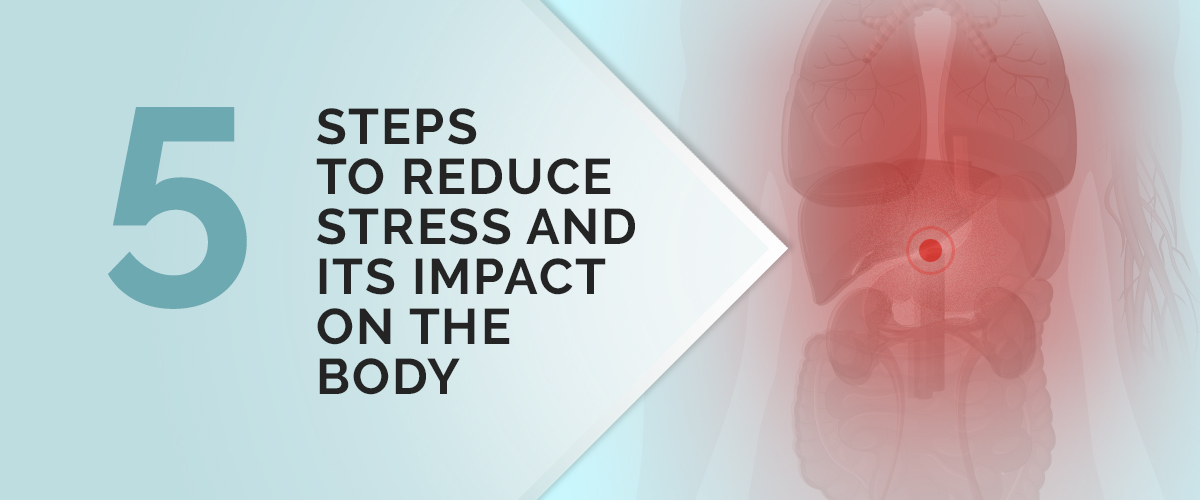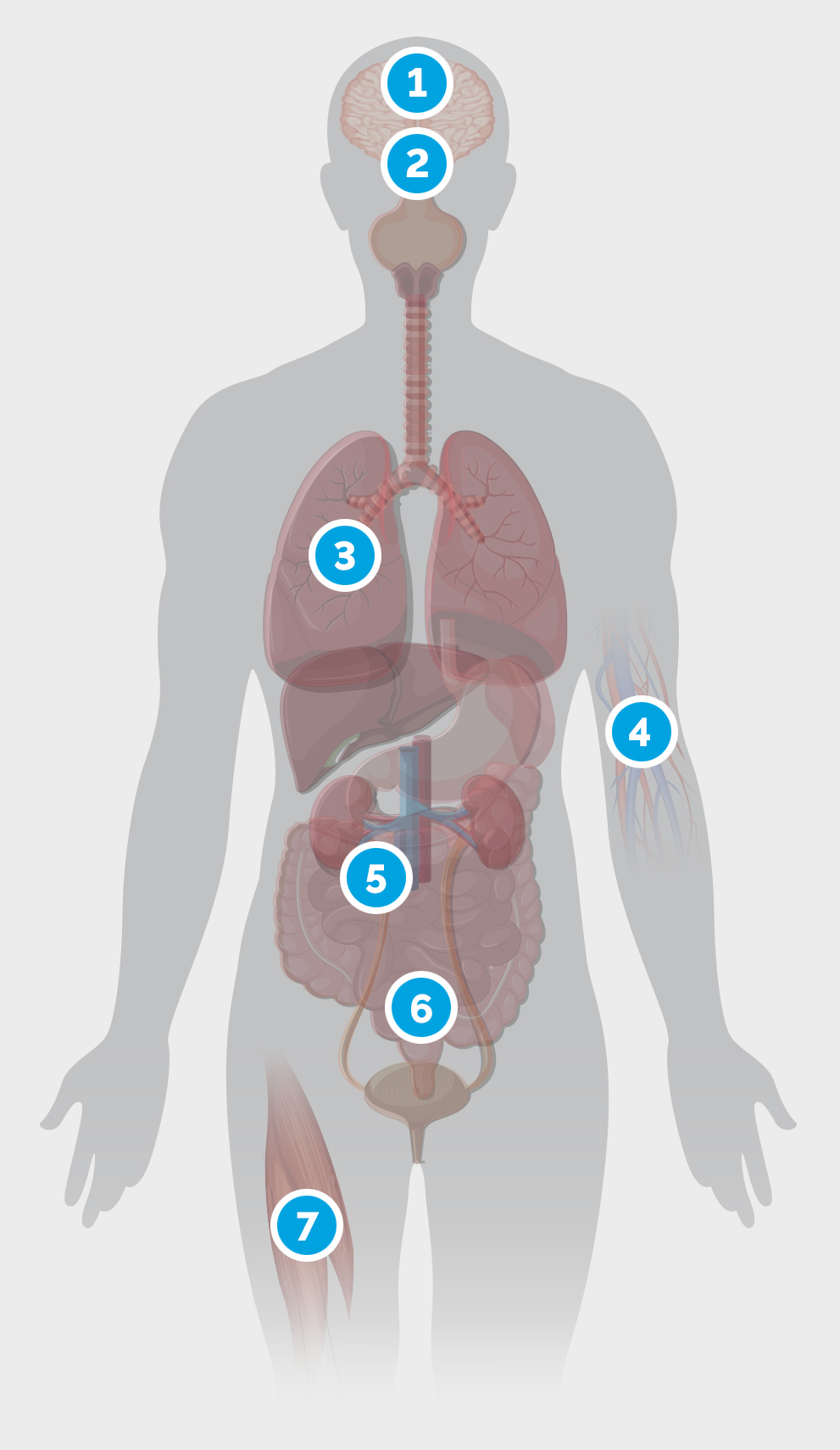Five Steps to Reduce Stress
From stretching to mindfulness, follow these simple strategies to reduce stress and its impact on the body.

Three out of four adults in the U.S. say they suffer symptoms of stress, such as headaches, stomachaches, fatigue, and insomnia, according to the American Psychological Association. “Many people don’t realize how damaging stress can be,” says Maria Biondi, RDN, CDN, a NYPBeHealthy well-being coach at NewYork-Presbyterian Queens. “Stress can impact many aspects of well-being, including your sleep, digestion, and overall outlook on life.”
But there are easy strategies to help you relax and de-stress.
“Making a commitment of just 10–30 minutes daily to exercise, stretch, listen to music, meditate, or practice any other form of self-care may help you feel calmer and allow you to reset,” says Biondi, who suggests these five simple steps to reduce stress.
Stretching
Gentle stretching can be a great way to reduce stress and can be done at home, work, or the gym. While avid yoga practitioners may devote upward of an hour to various stretches and poses, a simple series of yoga-inspired stretches can release muscle tension and calm breathing.
“I enjoy calming poses such as child’s pose, downward dog, or even just lifting both arms up and stretching gently to each side,” Biondi says. “It is amazing how even just a few moments in each stretch can really help reduce stress.”
Breathing
When the body is under stress, heart rate and blood pressure increase and breathing accelerates. Controlled breathing may help by sending more oxygen to the brain and stimulating the parasympathetic nervous system, which results in a state of calmness.
The American Institute of Stress recommends the “teddy bear breathing” method, which is tailored to kids but can be used by adults as well.
Start by lying on your back. Then place one hand on your chest and place a light object — such as a teddy bear, plastic cup, or anything you can see while lying down — on your belly button. Then let your body become relaxed; place a blanket if needed under your head to relax the neck. Slowly breathe in through your nose. The object you’ve placed on your waist should slowly rise while your chest stays still. Hold a full, deep breath, count to three, then slowly breathe out. Repeat a handful of times until you feel more relaxed. If you are not able to lie down while doing this exercise, you can practice while sitting in a chair and placing one hand on your chest and one hand on your belly.
“I also like 4-7-8 breathing,” Biondi says. “You start by breathing in deeply for 4 seconds, then holding the breath for 7 seconds, followed by slowly releasing all the air in the lungs for 8 seconds. You can do this up to four times in a row, and it is a great technique that can be done at your desk, in the car, on a checkout line, or anytime you are feeling some tension.”

-

Nervous System
When the body is stressed, the nervous system signals the adrenal glands, situated above the kidneys, to release the hormones adrenalin and cortisol. This release causes the heart to beat faster, the respiration rate to increase, blood vessels in the arms and legs to dilate, the digestive process to change, and glucose levels in the bloodstream to increase to deal with the emergency. As the nervous system continues to trigger physical reactions over a prolonged period, it causes wear and tear on the body. -

Endocrine System
When stressed, the hypothalamus, which connects the brain and the endocrine system, signals the pituitary gland to produce a hormone that signals the adrenal glands to increase production of cortisol. Chronic stress can weaken communication between the immune system and what is known as the HPA axis, which has been linked to the development of numerous physical and mental health conditions, including chronic fatigue, metabolic and immune disorders, and depression. -

Respiratory System
The respiratory system supplies oxygen to cells and removes carbon dioxide waste from the body. Stress and strong emotions can cause shortness of breath and rapid breathing, as the airway between the nose and the lungs constricts. Stress can also exacerbate breathing problems for people with pre-existing respiratory diseases, such as asthma and chronic obstructive pulmonary disease. -

Cardiovascular System
When the stress hormones adrenaline, norepinephrine, and cortisol are released, they can trigger an increase in heart rate and stronger contractions of the heart muscles. These hormones can also cause your blood vessels to narrow, elevating your blood pressure (hypertension). An ongoing surge in heart rate, elevated stress hormones and elevated blood pressure can increase the risk for hypertension, heart attack, and stroke. -

Gastrointestinal System
The gut has hundreds of millions of neurons that function fairly independently and are in constant communication with the brain, explaining the ability to feel “butterflies” in the stomach. Stress can affect this brain-gut communication and may trigger pain, bloating, and other abdominal discomfort. -

Reproductive System
In males, chronic stress can affect testosterone production, causing a decline in sex drive. It may also cause erectile dysfunction or impotence and can negatively affect sperm production and maturation. In females, chronic stress may be associated with absent or irregular menstrual cycles, more painful periods, and can affect a woman’s ability to conceive, the health of her pregnancy, and her postpartum adjustment. -

Musculoskeletal System
Chronic stress causes muscles to be in a constant state of guardedness. When muscles are tense for long periods, it can trigger other reactions in the body and even promote stress-related disorders, such as tension headaches and migraines, which are associated with chronic muscle tension in the shoulders, neck, and head.
Source: American Psychological Association
Practicing Mindfulness
Mindfulness, or being present, can reduce stress by allowing people to be aware of their physical or emotional condition without criticizing or judging themselves.
Biondi recommends bringing mindfulness to self-care activities. “You can start by choosing one thing to focus on, whether it is increasing your weekly meditations, adding in one workout a week, or not overeating between parties and events. Focusing on one thing can help you observe what you are currently doing and start to make small changes.”
She also recommends not fixating on doing each goal perfectly. “Sometimes we can get off track, and that is totally OK,” Biondi says. “Rather than feeling bad about not accomplishing a goal, try bringing awareness to the situation, accepting it, and starting again.”
Eating Well
Who hasn’t reached for a candy bar or bag of chips instead of sitting down to lunch when on the go or focused on ticking off items on that to-do list?
The problem is that the sugar rush ends in a crash several hours later, leaving one depleted and less able to handle stress. The same goes for caffeinated drinks in the afternoon or evening, which provide a short-term boost but can interfere with sleep, and high-fat, carb-heavy foods like pizza or macaroni and cheese, which may be comforting but can leave one feeling lethargic or bloated.
Better bets are high-fiber, complex carbohydrate-rich foods like sweet potatoes, bean-based soups, oatmeal, or sautéed vegetables over quinoa. Because stress can weaken the immune system, a diet rich in fruits and vegetables provides the essential minerals and nutrients needed to keep energy levels consistent and sickness at bay.
“I find entering the workweek with a prepared plan of what to eat is the best way to stay on track, even on the busiest days,” Biondi says. “The cold weather months are a great time to take advantage of being indoors and meal prepping. My favorite lunch to bring on cold winter days is homemade minestrone soup packed with butternut squash, spinach, carrots, and other winter vegetables.”
Biondi also recommends picking fresh fruits in season that are loaded with vitamin C. “Vitamin C is great for helping support the immune system. Luckily, fruits and vegetables such as collard greens, clementines, oranges, and kiwis are in season during the winter months and are good sources for vitamin C.”

Maria Biondi
Exercising
Staying physically fit has numerous benefits, including boosting cardiovascular and muscular health and fighting disease. But exercise also positively affects the body by relieving stress, reducing depression, and improving cognitive function.
The good news is there are many ways to squeeze in the American Heart Association-recommended 150 minutes of weekly exercise into 30-minute increments, including:
- Leave home 15 minutes earlier and get off the subway a few stops before and walk to work, then walk to that same station when you leave at the end of the day. If possible, opt for the stairs over the escalator.
- Take a 30-minute walk at lunchtime or plan some walking meetings indoors or outdoors.
- Do stretches, pushups, high knees, or jumping jacks during commercial breaks while you’re watching TV or before a shower.
- Try a free workout video on YouTube or make a night out with friends by trying a different exercise class.
- Do squats at your desk or lift a light pair of weights for 10-minute increments three times per day.
Maria Biondi, RDN, CDN, is an NYPBeHealthy well-being coach at NewYork-Presbyterian Queens. She has a background in nutrition education, health, and well-being programming for NYPBeHealthy, and in nutrition counseling. She is also an adjunct lecturer at Queens College and a member of the Academy of Nutrition and Dietetics and Greater New York Dietetics Association.
Additional Resources
To learn more about NewYork-Presbyterian’s food and nutrition services, click here.
Find out how NewYork-Presbyterian’s Integrative Health and Wellbeing Program can help prevent disease, promote relaxation, reduce stress and anxiety, and relieve symptoms associated with disease or its treatment.
If you feel that stress is becoming overwhelming, it’s time to seek professional help. You can find a psychiatrist or therapist in your area or call a crisis hotline, such as the National Suicide Prevention Lifeline (800-273-8255) or NYC Well (888-NYC-WELL or text “WELL” to 65173), if you feel it is an emergency. Both services are available 24/7 and also offer online chat.









